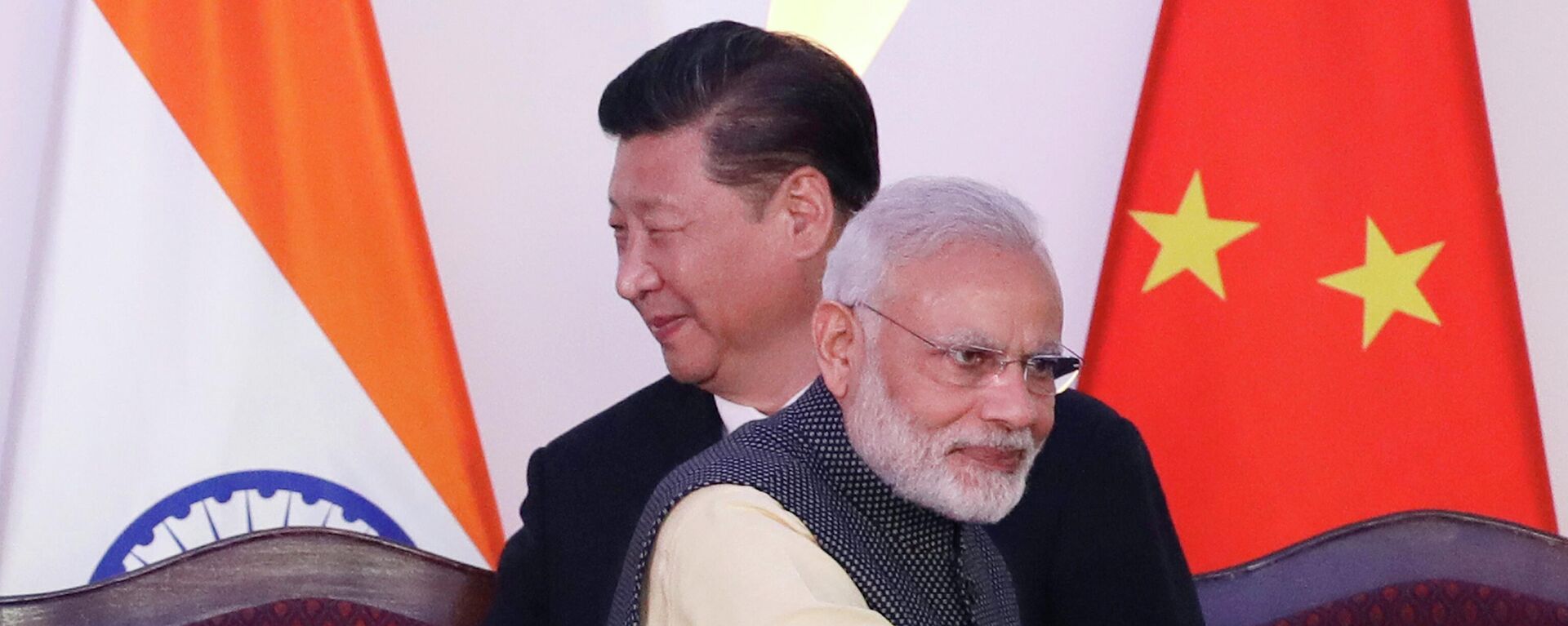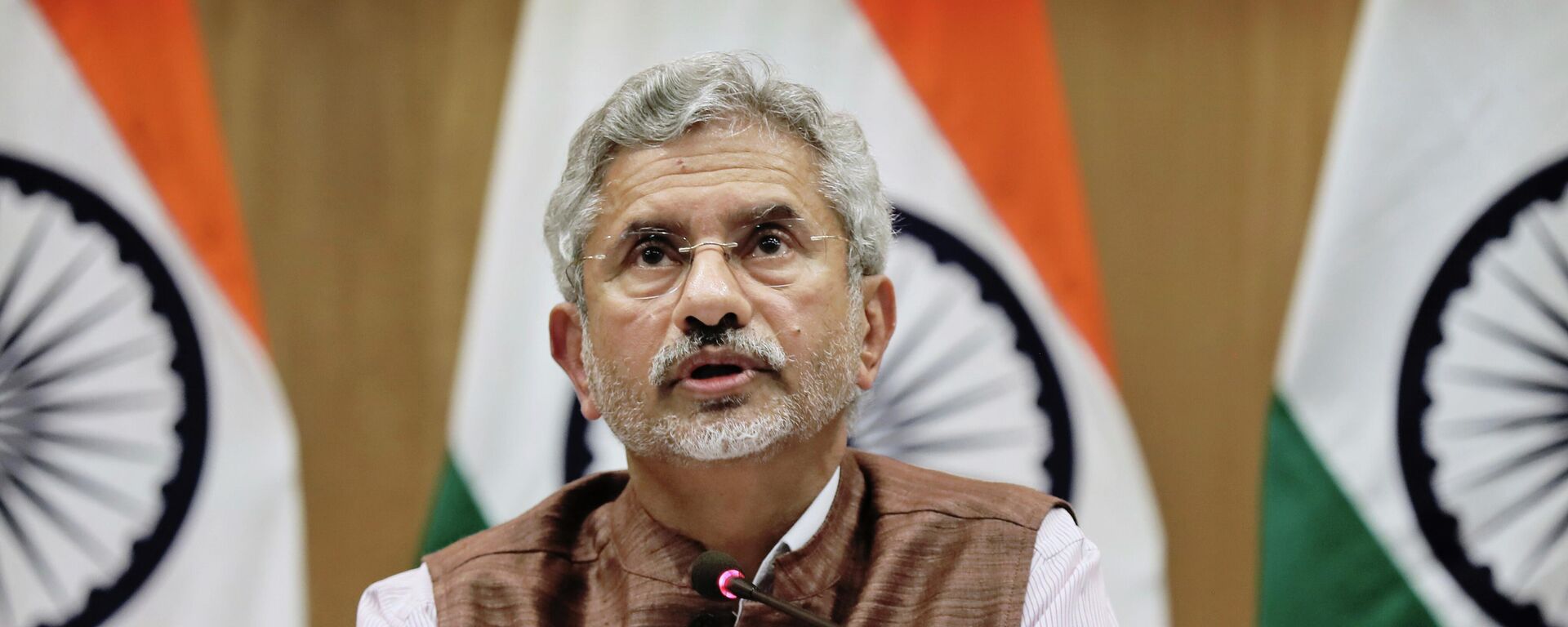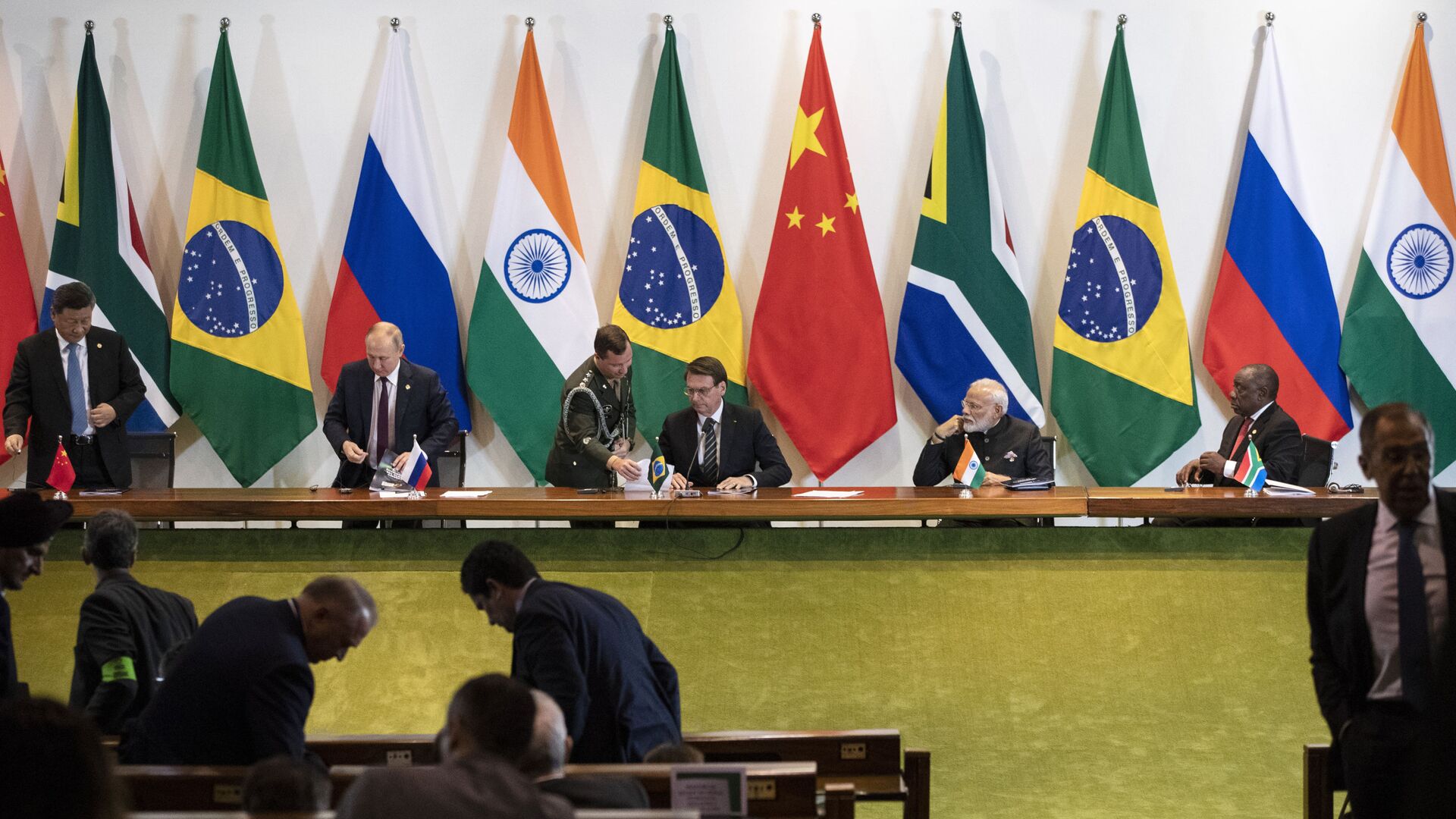https://sputnikglobe.com/20221025/conflict-between-india--china-is-only-to-advantage-of-us--west-1102587043.html
Conflict Between India & China is 'Only to Advantage of US & West'
Conflict Between India & China is 'Only to Advantage of US & West'
Sputnik International
Non-Western states have opposed the US vision for the Indo-Pacific, calling it a US-led attempt to contain and exclude China. In particular, Russian experts... 25.10.2022, Sputnik International
2022-10-25T15:54+0000
2022-10-25T15:54+0000
2023-04-13T12:45+0000
analysis
brics
russia
ladakh standoff
china
us
pakistan
pentagon
https://cdn1.img.sputnikglobe.com/img/107731/37/1077313719_0:109:3073:1837_1920x0_80_0_0_b8de142811f66013bc39f11a199f2345.jpg
BRICS needs to make more serious efforts to intensify commerce and trade besides expanding it by adding countries across the Atlantic Ocean, according to Major General B.K. Sharma (retd.), director of the United Service Institution of India, a think tank. Speaking to Sputnik, the former Indian military officer reckoned that complementarity in the economic relations between BRICS members will turn into a “very sound and robust political relationship.”Speaking on the sidelines of the Valdai International Discussion Club, he said the goal of creating BRICS was to establish a group that was not confined to Eurasia, but one that would extend across the Atlantic Ocean to include nations in other parts of the world.Saudi Arabia is the latest nation to express its desire to join the BRICS grouping, which represents around 40 percent of the global population. Prior to that, Argentina and Iran applied for full BRICS membership, while Indonesia and Algeria have also expressed interest in joining the bloc.Despite Lingering Border Tensions, Conflict Not in Interest of India & ChinaFurthermore, the expert also observed that the border dispute between India and China, two prominent members of the group, would not negatively impact either the BRICS, including the trilateral group of Russia, India and China, known as "RIC," or Delhi’s bilateral ties with Moscow.Despite the border differences, India and China have managed to cooperate in multilateral group meetings such as those at the Shanghai Cooperation Organization (SCO) and BRICS.What's more, India extended its full support to China in assuming the BRICS presidency this year. Meanwhile, tensions between the neighbors have persisted along the Line of Actual Control — a loosely demarcated border between the two — since June 2020, when a deadly clash left 20 Indian and four PLA soldiers dead.As the 20th National Congress of the Chinese Communist Party decided to extend President Xi Jinping’s tenure for another five years, Sharma reckoned that Beijing should take into account Delhi’s “core concerns” and “work very assiduously” to resolve the lingering boundary issues.India's Desire to Diversify Imports Shouldn't Be Overplayed as at Cost of RussiaThe US has been pushing India to lessen its dependence on Russia in terms of both military equipment and energy trade, publicly urging Delhi to curb Russian defense imports as Moscow “is no longer a reliable weapons supplier.”Dismissing these claims, Sharma said that there has been a free flow of weapons and other military hardware from Russia that India needs to build up its operational effectiveness in the aftermath of the Galwan Valley clash with China.“And in times to come, I think Russia will fulfill all its promises. The only problem is because [Russia is] at war with the West, and this may inhibit some of [its] capacities to manufacture and deliver those goods to India,” Sharma assumed.However, both New Delhi and Moscow have reiterated that the ongoing military operation in Ukraine has not had any impact on military supplies.The bulk of India’s conventional weapons are sourced from Russia, and it has relied heavily on Moscow to sustain its forces, including for spares, maintenance, and upgrades for years. According to data firm the Stockholm International Peace Research Institute, Russia was the top arms supplier to India between 2017 and 2021, making up 46% of New Delhi’s arms imports. 'We Want a Stable Pakistan'Indian Foreign Minister S. Jaishankar recently hit out at the US for having chosen the “military dictatorship” in Pakistan as the preferred defense partner for decades. His remarks came amid renewed efforts by Washington and Islamabad to reset ties after ex-Prime Minister Imran Khan was ousted from power in April.As such, the Biden administration announced a $450 million F-16 maintenance package for Pakistan despite serious concerns raised in Delhi that Pakistan’s fleet of the fighter jets is directed against the Indian Armed Forces.Sharma further believes that political turmoil in Islamabad will not influence India-Pakistan relations in any way. The US regards India as an important pillar of its Indo-Pacific strategy, primarily meant to counter the growing maritime strength of China in the South China Sea and Asia-Pacific in general. As China, Iran, and Russia are planning to hold military drills in the Indian Ocean soon, Sharma denied speculation that not including India in these drills would impact relations between New Delhi, Moscow, and Beijing.Adding that it is their prerogative what kind of exercises they conduct, Sharma said that the Indian Armed Forces have been participating with China and Pakistan on a normal basis under the aegis of the Shanghai Cooperation Organization.
https://sputnikglobe.com/20220923/china-russia-want-greater-role-for-india-brazil--south-africa-in-drive-to-reform-unsc-1101115472.html
https://sputnikglobe.com/20221010/india-slams-west-for-supplying-weapons-to-pakistan-for-decades-as-it-lauds-defense-ties-with-russia-1101665406.html
russia
ladakh standoff
china
pakistan
Sputnik International
feedback@sputniknews.com
+74956456601
MIA „Rosiya Segodnya“
2022
Denis Bolotsky
https://cdn1.img.sputnikglobe.com/img/07e5/06/0b/1083128270_0:0:961:960_100x100_80_0_0_8cd81dafcbaac1c176c25141f8af1d2a.jpg
Denis Bolotsky
https://cdn1.img.sputnikglobe.com/img/07e5/06/0b/1083128270_0:0:961:960_100x100_80_0_0_8cd81dafcbaac1c176c25141f8af1d2a.jpg
News
en_EN
Sputnik International
feedback@sputniknews.com
+74956456601
MIA „Rosiya Segodnya“
Sputnik International
feedback@sputniknews.com
+74956456601
MIA „Rosiya Segodnya“
Denis Bolotsky
https://cdn1.img.sputnikglobe.com/img/07e5/06/0b/1083128270_0:0:961:960_100x100_80_0_0_8cd81dafcbaac1c176c25141f8af1d2a.jpg
brics, russia, ladakh standoff, china, us, pakistan, pentagon
brics, russia, ladakh standoff, china, us, pakistan, pentagon
Conflict Between India & China is 'Only to Advantage of US & West'
15:54 GMT 25.10.2022 (Updated: 12:45 GMT 13.04.2023) Non-Western states have opposed the US vision for the Indo-Pacific, calling it a US-led attempt to contain and exclude China. In particular, Russian experts and politicians have repeatedly pointed out that the concept of the Indo-Pacific is flawed, as it erodes ASEAN’s centrality in favor of extra-regional actors engaged in great power competition.
BRICS needs to make more serious efforts to intensify commerce and trade besides expanding it by adding countries across the Atlantic Ocean, according to Major General B.K. Sharma (retd.), director of the United Service Institution of India, a think tank.
Speaking to Sputnik, the former Indian military officer reckoned that complementarity in the economic relations between BRICS members will turn into a “very sound and robust political relationship.”
Speaking on the sidelines of the Valdai International Discussion Club, he said the goal of creating BRICS was to establish a group that was not confined to Eurasia, but one that would extend across the Atlantic Ocean to include nations in other parts of the world.
"But there is a far more serious effort required to revitalize and re-energize BRICS. It should not be a talking shop, [where] we do some talking — we have a declaration and there is no follow-through,” Sharma said.
Saudi Arabia is the latest nation to
express its desire to join the BRICS grouping, which represents around 40 percent of the global population. Prior to that, Argentina and Iran applied for full BRICS membership, while Indonesia and Algeria have also expressed interest in joining the bloc.
Despite Lingering Border Tensions, Conflict Not in Interest of India & China
Furthermore, the expert also observed that the border dispute between India and China, two prominent members of the group, would not negatively impact either the BRICS, including the trilateral group of Russia, India and China, known as "RIC," or Delhi’s bilateral ties with Moscow.
“I think the Chinese factor will not come in the way of India-Russia cooperation. It has not come in the past, and it will not come in the future,” the retired Indian major general said.
Despite the border differences, India and China have managed to cooperate in multilateral group meetings such as those at the Shanghai Cooperation Organization (SCO) and BRICS.
What's more, India extended its full support to China in assuming the BRICS presidency this year.
Meanwhile, tensions between the neighbors have
persisted along the Line of Actual Control — a loosely demarcated border between the two — since June 2020, when a deadly clash left 20 Indian and four PLA soldiers dead.

23 September 2022, 09:00 GMT
As the 20th National Congress of the Chinese Communist Party decided to extend President Xi Jinping’s tenure for another five years, Sharma reckoned that Beijing should take into account Delhi’s “core concerns” and “work very assiduously” to resolve the lingering boundary issues.
“If we talk about the Asian Century and if the two great nations of the big powers are fighting against each other, it is only to the advantage of the West and the United States,” Sharma noted.
India's Desire to Diversify Imports Shouldn't Be Overplayed as at Cost of Russia
The US has been pushing India to lessen its dependence on Russia in terms of both military equipment and energy trade, publicly urging Delhi to curb Russian defense imports as Moscow “is no longer a reliable weapons supplier.”
Dismissing these claims, Sharma said that there has been a free flow of weapons and other military hardware from Russia that India needs to build up its operational effectiveness in the aftermath of the Galwan Valley clash with China.
“And in times to come, I think Russia will fulfill all its promises. The only problem is because [Russia is] at war with the West, and this may inhibit some of [its] capacities to manufacture and deliver those goods to India,” Sharma assumed.
However, both New Delhi and Moscow have reiterated that the ongoing military operation in Ukraine has not had any impact on military supplies.
The bulk of India’s conventional weapons are sourced from Russia, and it has relied heavily on Moscow to sustain its forces, including for spares, maintenance, and upgrades for years. According to data firm the Stockholm International Peace Research Institute, Russia was the top arms supplier to India between 2017 and 2021, making up 46% of New Delhi’s arms imports.
“We are diversifying our military hardware imports from other countries, like Israel and the US, [which] any country would like to do. So that should not be over-exaggerated and overplayed that it is at the cost of Russia,” Sharma cautioned.

10 October 2022, 06:42 GMT
'We Want a Stable Pakistan'
Indian Foreign Minister S. Jaishankar recently hit out at the US for having chosen the “military dictatorship” in Pakistan as the preferred defense partner for decades. His remarks came amid renewed efforts by Washington and Islamabad to reset ties after ex-Prime Minister Imran Khan was ousted from power in April.
As such, the Biden administration announced a $450 million F-16 maintenance package for Pakistan despite serious concerns raised in Delhi that Pakistan’s fleet of the fighter jets is directed against the Indian Armed Forces.
Sharma further believes that political turmoil in Islamabad will not influence India-Pakistan relations in any way.
“We want a stable Pakistan, and we want a strong government that doesn't have too much of the influence of the Pakistan military to dictate an agenda. As long as [a] strong government emerges and whatever dialogue they have with India that is withheld and not a helpful state to terrorism, we would be very happy to cooperate with Pakistan,” the retired major general said.
The US regards India as an important pillar of its Indo-Pacific strategy, primarily meant to counter the growing maritime strength of China in the South China Sea and Asia-Pacific in general.
As China, Iran, and Russia are planning to hold military drills in the Indian Ocean soon, Sharma denied speculation that not including India in these drills would impact relations between New Delhi, Moscow, and Beijing.
“I don't think that we should look at it in such binary terms. This is a normal international practice that a group of countries do military exercises. We also do Malabar [exercises] and many other series of actions in which Pakistan and China are not included", Sharma reckoned.
Adding that it is their prerogative what kind of exercises they conduct, Sharma said that the Indian Armed Forces have been participating with China and Pakistan on a normal basis under the aegis of the Shanghai Cooperation Organization.








